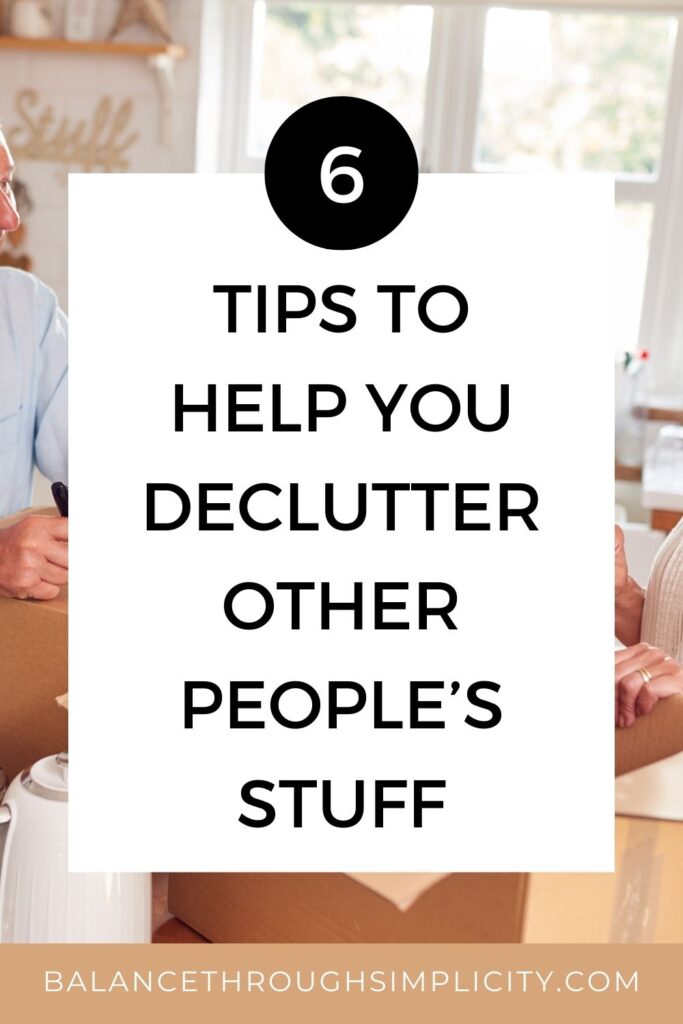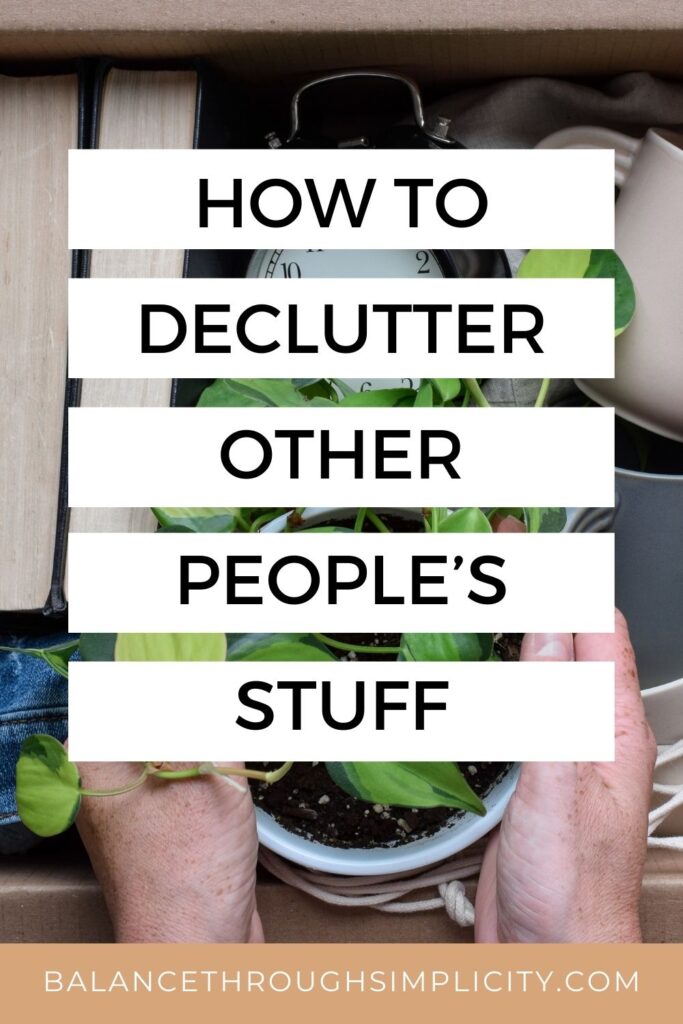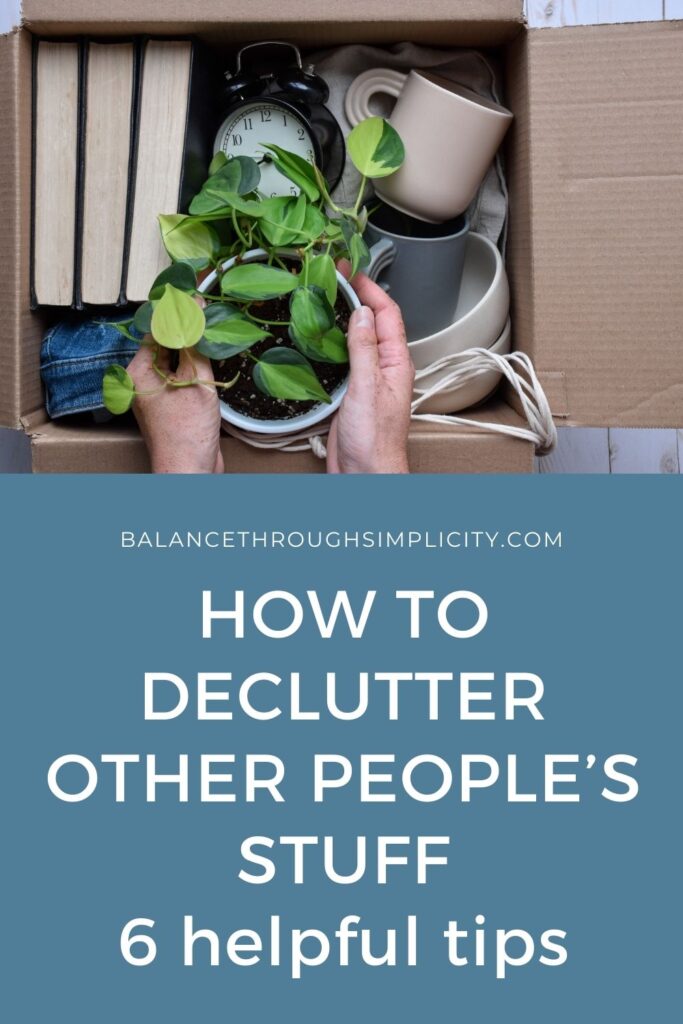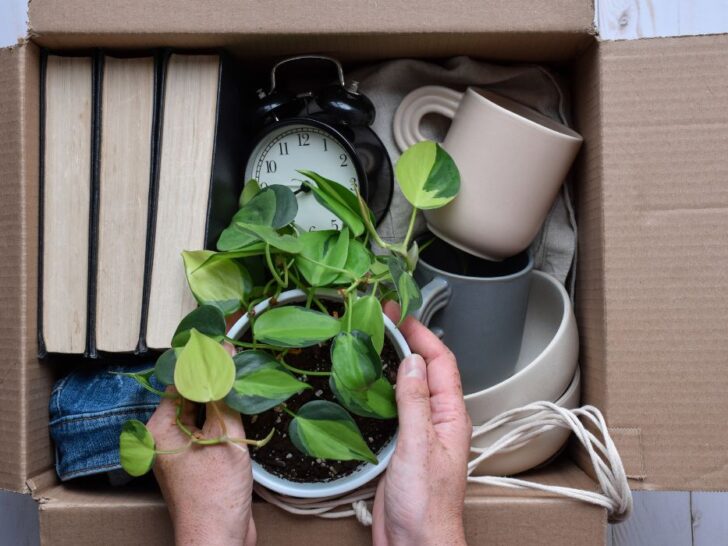HOW TO DECLUTTER OTHER PEOPLE’S STUFF: 6 HELPFUL TIPS
Decluttering our own stuff can be difficult, physically and emotionally, but it can also be tough decluttering other people’s stuff for them or on their behalf. Here are 6 helpful tips on how to declutter other people’s stuff with less stress and more success.
HOW NOT TO DECLUTTER OTHER PEOPLE’S STUFF!
One of the first decluttering mistakes I made was to declutter other people’s stuff in my home, namely stuff belonging to my husband. It wasn’t anything big, valuable or particularly important. It was just a few clothes that he never wore but when he found out, he wasn’t too happy.
He said that he might need them some day, that he would’ve preferred to keep them just in case and that they weren’t taking up much space so why did I feel the need to declutter them?
For regular readers who know of my husband from other stories and blog posts I’ve shared, he’s a hoarder and loves stuff. His arguments for keeping things are all valid but, for me, the benefits of decluttering and owning less stuff far outweigh the disadvantages of getting rid of things I may or may not later need.
I admit I made the mistake of decluttering his stuff, without asking, albeit with all good intentions and I haven’t made the same error of judgement again. I always ask and let him make the final decision about what to do with his stuff.
WHY WE NEED TO DECLUTTER OTHER PEOPLE’S STUFF SOMETIMES
Although I’d rarely suggest you declutter other people’s stuff because of what I learnt myself, there are times when you might need to do this.
For example, if someone is unable to declutter themselves because of poor physical or mental health, maybe mobility or capacity is restricted or it becomes a necessity, for example, moving into care. Alternatively, if they ask for your help and support or to take on the task yourself so they don’t have to be burdened by it.
In this article I wanted to share some tips on how to declutter other people’s stuff for them.
Note: Although some of the tips relate to HELPING people declutter, I wanted to share tips to help you declutter FOR someone, or on behalf, of others. Normally something that’s not encouraged, but has to happen from time to time. I hope they help you declutter more easily and with more success.

HOW TO DECLUTTER OTHER PEOPLE’S STUFF FOR THEM
Here are 6 tips on how to declutter other people’s stuff for them. Some of these tips may or may not be relevant depending on how much the owner of the stuff wants, or is able to be, involved in the decluttering.
1. Understand that clutter is different for everyone
My idea of clutter is different to my husband’s. He has tools and gadgets that he loves, but I don’t have a clue how to use them, let alone, would use them. To me they’re clutter but to him they’re valuable and purposeful.
Taking time to appreciate other views of what’s clutter, and what’s not, is a great first step in knowing how to declutter other people’s stuff. Whether you’re decluttering FOR them or alongside them, it’s important that you all understand the definition of clutter. Otherwise, your end points will be different and so will the route that you use to get there.
Do you know exactly what clutter you’re needing to get rid of? Is it what YOU think needs decluttering or is it what the owner of that stuff thinks needs decluttering? The two might not be the same.
Further reading: What is clutter? 7 ways to think about your stuff
2. Understand what decluttering means
Sometimes we have different definitions of decluttering.
- Does it mean getting more organised and putting things away in some kind of organised, structured order?
- Does it mean shuffling a few things around in a room to clear a route for easy access?
- Does it mean tackling the surface clutter that you can see on tabletops?
- Or to move a pile of magazines so you can sit on the sofa or put your mug down on the table without having to move things?
- Or, does it mean emptying a room completely?
- Or clearing the garage so you can park your car in it?
Organising and moving clutter around is NOT decluttering. Decluttering just the stuff that gets in your way, or that builds up on tables is PARTIALLY decluttering. Emptying a room completely is decluttering at the other end of the spectrum!
What does decluttering mean to you and to the person whose stuff it is?
- Do they really care if you’re decluttering, or organising, or shuffling stuff around?
- Do they know why you’re decluttering? Did they ask you specifically? Are they aware of what you’re doing and why?
3. Understand decluttering fears
Getting rid of stuff can make us anxious for many reasons. The most common decluttering fears make us worried about getting rid of items we might later regret or that cost us money. What about those items that we keep ‘just in case’ we need them, or remind us of a lifestyle or person we once were and hope to have or be again?
Decluttering sentimental stuff often means facing up to tough emotions such as grief and loss.
Decluttering often requires a certain amount of self-acceptance and facing up to truths.
Many of our decluttering fears come about for a variety of reasons so decluttering other people’s stuff will be easier and cause less tension if you understand their particular worries or concerns.
- Are there any items or types of item that they don’t want to declutter. If so, why?
- Maybe explore ways to overcome fears about:
- Wasting money by selling high value or rare items
- Parting with sentimental items by seeing if you can repurpose, downsize or use a memory box
- Needing the item in the future by finding out how you could rent or borrow another. Perhaps there’s something similar that could be used instead? Or, if there are multiples of an item, could you keep hold of one and declutter the rest?

4. Decide on a plan of action
Having a decluttering plan of action is helpful, regardless of whether you’re decluttering for yourself or for other people.
That’s so you know:
- What decluttering goal you’re trying to achieve
- How you will know when that goal has been achieved
- The timescale or deadline when it is to be done by
- What other resources or support are needed to achieve the goal
It may be that the person you’re decluttering for doesn’t want, or isn’t able, to be involved at all. Or, they may want to have a loose idea but leave the details down to you.
Depending on the situation, you may want to come up with the decluttering plan together or just keep it to yourself. It’s sometimes helpful for the person whose stuff you’re decluttering to retain an element of control, to feel involved in and included by ‘project-managing’ the decluttering even if they’re not able to physically help you.
You might like to think or talk about:
- Are you going to start in one particular room? Or with one type of item?
- Will you use a room as holding space for clutter that you’re getting rid of or in the process of sorting through?
Whether you write down the decluttering plan of action (there’s a free printable for this which you can get at the bottom of this article) or keep it in your head, it does cover some important points about what you’re wanting to achieve, how you’re going to do it and when you’re going to do it by.
These are all-important for any decluttering, including how you declutter other people’s stuff.
5. Decide what you’re going to do with the unwanted stuff
Knowing what to do with the stuff you’ve decluttered is an important part of the process. It’s easy to forget about it and be faced with a pile of bags or boxes that you keep meaning to take for recycling or to the donation centre!
Other times you might find yourself, or others in your household, rooting through the stuff and pulling things out to keep back.
It can be stressful and uncomfortable seeing piles of your stuff waiting to be gotten rid of. And, it can cause extra tension as you declutter each item if you’re not on the same page about where that item is going to end up if you’re not keeping it.
Some people have firm ideas about donating to help others in need, or getting money back on items that cost good money in the first place.
If you’re decluttering someone else’s stuff and you think this part of the process could be difficult or cause divided opinions, maybe some honest conversations before you start could be worthwhile.
6. Be ready for an emotional response
Decluttering isn’t just a physical act, it can also bring about a highly emotional response. Here are some scenarios:
- You’re decluttering for your mother who lost her husband, your father. She’s kept back lots of clothes, books and other items belonging to your dad and never felt the need or was able to part with them. She now has to downsize and can’t take everything with her so you’re encouraging her to declutter some of your father’s items. Not only does your mother find it tough because she’s leaving her home, but because she feels she’s losing the memories of her husband too.
- You’re decluttering for your elderly father who’s no longer able to walk safely around his home. He needs mobility aids and carers who come to tend to his personal and daily needs. You know his home would be safer and easier without so much stuff, but he’s adamant in keeping home just like it’s always been. Your father finds decluttering tough because he feels forced to get rid of stuff and, with it, an element of control and independence. Life feels scary and home is full of change.
These are just a couple of common situations that many of us find ourselves in when we’re decluttering other people’s stuff. But it doesn’t have to be just for the older generation. It could be:
- Decluttering your kids’ stuff if they’ve flown the nest and you’re dealing with the stuff they’ve left behind.
- Or a friend is drowning in stuff, struggling with overwhelm and hoarding problems and they’ve cried out for you to declutter for/with them.
- You live with someone neurodivergent, for example, with ADHD or Autism and they struggle to manage their environment. They want to declutter but find the process challenging so ask for your help.
Stuff is often physical items wrapped up in emotional gift wrap, so it becomes tougher to know what to do with it.
We have to work through those emotions for ourselves to unwrap what to do with the physical item itself.
This is hard enough when we’re decluttering our own stuff, but helping someone else do this with their stuff often requires compassion, encouragement, support, motivation and treading a fine line between all of these.
No easy answers except for keeping in mind the reason for decluttering.

PRACTICAL TIPS AND ACTION STEPS FOR DECLUTTERING OTHER PEOPLE’S STUFF
I’ve already listed a few helpful tips and things to think about to help you declutter other people’s stuff. Here are some practical, action-based ideas you could try too when helping people to declutter:
- Go slowly – If decluttering everything, all at the same time, feels difficult or unrealistic, do a little bit at a time to get comfortable with decluttering.
- Set a timer – Helps to break down big tasks into manageable chunks.
- Get prepared before you start – Avoid the stop and start by getting everything you need near at hand.
- Don’t judge – You’re decluttering other people’s stuff, not to judge them for having too much of, or the wrong kind of clutter.
- Do an example declutter – Do one decluttering project and walk through the process of what you’ll declutter and how to ease in slowly and set expectations.
- Turn it into a positive – Reframe decluttering as getting rid of things to be instead about donating to charity or making a little bit of money back from selling the items.
- Don’t rush – Listen to their worries and be gentle in explaining what you’re doing and why.
- Offer help throughout – This could be chatting through worries, physical help in packing and taking away unwanted, decluttered items, making drinks and making it enjoyable..
DECLUTTERING TOYS
Just a little side note on decluttering toys. Another example of decluttering other people’s stuff is when we declutter toys that belong to our kids.
I wrote an article on this which you might find helpful and some things to bear in mind depending on the age, level of understanding and ability of your kids.
Further reading: How to declutter toys
SHARE YOUR THOUGHTS
I hope these tips are helpful if you need to declutter other people’s stuff.
Have you had to declutter someone else’s stuff? If so, did you find it difficult? What was the MOST difficult about it?
Do you have any other tips to share that would help others having to do the same at the moment?
I’d love to hear from you so please leave a comment below.
DON’T MISS OUT!
I’m Antonia and on this blog I share practical inspiration to simplify your home, time and life. Follow me on Instagram, Facebook and Pinterest! You can also subscribe to Balance Through Simplicity and receive regular simplicity tips straight to your inbox for free. Make sure you never miss an article plus you’ll get a copy of my free Declutter Starter Kit as a welcome gift!

